Unit1-6
- 格式:doc
- 大小:61.00 KB
- 文档页数:5
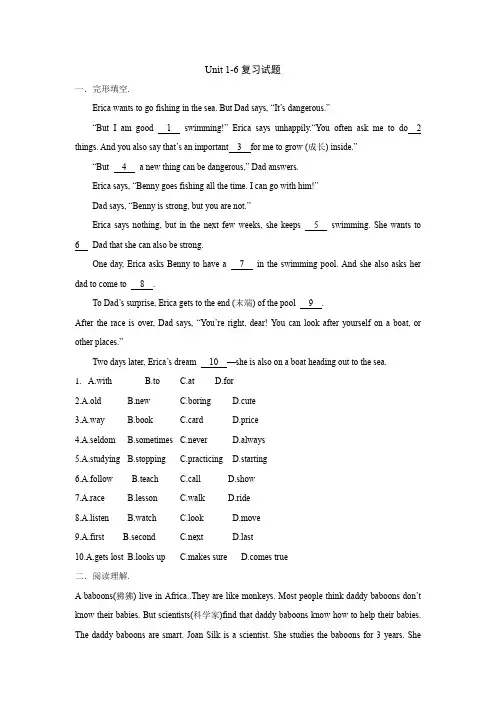
Unit 1-6复习试题一.完形填空.Erica wants to go fishing in the sea. But Dad says, “It’s dangerous.”“But I am good 1swimming!” Erica says unhappily.“You often ask me to do2 things. And you also say that’s an important3for me to grow (成长) inside.”“But 4 a new thing can be dangerous,” Dad answers.Erica says, “Benny goes fishing all the time. I can go with him!”Dad says, “Benny is strong, but you are not.”Erica says nothing, but in the next few weeks, she keeps 5swimming. She wants to 6Dad that she can also be strong.One day, Erica asks Benny to have a 7in the swimming pool. And she also asks her dad to come to 8.To Dad’s surprise, Erica gets to the end (末端) of the pool 9.After the race is over, Dad says, “You’re right, dear! You can look after yourself on a boat, or other places.”Two days later, Erica’s dream 10—she is also on a boat heading out to the sea.1. A.with B.to C.at D.for2.A.old B.new C.boring D.cute3.A.way B.book C.card D.price4.A.seldom B.sometimes C.never D.always5.A.studying B.stopping C.practicing D.starting6.A.follow B.teach C.call D.show7.A.race B.lesson C.walk D.ride8.A.listen B.watch C.look D.move9.A.first B.second C.next st10.A.gets lost B.looks up C.makes sure es true二.阅读理解.A baboons(狒狒) live in Africa..They are like monkeys. Most people think daddy baboons don’t know their babies. But scientists(科学家)find that daddy baboons know how to help their babies. The daddy baboons are smart. Joan Silk is a scientist. She studies the baboons for 3 years. Shesays the daddy baboons are happy to see their babies. They have big teeth to help the babies to eat hard things. Mother baboons are small. And they all live in a place. When a mother baboon gives birth (分娩),she often has only one baby. Baby baboons have fur(毛皮).They are very cute. During the day, they play and eat things. At night,they sleep in the trees. Most children like baboons because they look like man.1.Where do baboons live?A.In Africa.B.In America.C.In Canada.D.In China.2.How are daddy baboons?A.They're shy.B.They're beautiful.C.They're clever.D.They're friendly.3.The underlined word “hard” means _____in Chinese.A.困难的B.容易的C.柔软的D.坚硬的4.The mother baboon usually has ________baby baboon(s) when she gives birth.A.oneB.twoC.threeD.four5.Which of the following is TRUE?A. Baboons are small monkeys.B. Baby baboons are very cute.C.Most children don't like baboons.D. Daddy baboons don't know how to help their babies.(B)Tony loves his grandma. She often tells him stories about Santa Claus (圣诞老人).Today is December 24th.Tony’s grandma takes him to Kevin’s Store to shop. She gives Tony fifty dollars and says, “Take the money and buy something for someone who needs it. I’ll wait for you in the car.”Tony thinks of everyone he knows: his family, friends and classmates. Then he thinks of Bobbie. Bobbie sits behind Tony. He doesn’t have a warm coat. Tony knows it because Bobbie never goes out to play in winter. So Tony buys a blue coat for him. It looks really warm.In the evening, his grandma helps Tony put the coat in a Christmas box, and writes “To Bobbie, From Santa Claus” on it. “Santa helps people but never lets them know,” Tony’s grandma says. They put the box in front of Bobbie’s house and then go back home joyfully.That night Tony knows Santa Claus is real, and they are on his team.6.Why does Tony buy Bobbie a warm coat?A.Because Tony has lots of money.B.Because Bobbie sits behind Tony.C.Because Bobbie doesn’t have one.D.Because Bobbie’s coat is too small.7..What is Tony like? A.Strict. B.Kind. C.Busy. D.Fun.8.What does the underlined word “joyfully” mean in Chinese?A.遗憾地B.懊悔地C.高兴地D.难过地9.What does the passage want to tell us?A.Santa Claus is busy.B.Everyone loves Santa Claus.C.There is no Santa Claus at all.D.Everyone can be Santa Claus.(C) Hello! My name is Alice. I have a great family. We all like music very much. Jenny is my mother. She is a great musician. She is good at playing the violin. She can also play the piano. She likes to sing and she can sing well. My father Tony is a teacher. He can’t play any instruments, but he likes music. He thinks it’s relaxing. When my mother plays the piano, he always listens to it.I like to play the guitar. It’s difficult at first, but I play it every day. So I can play it very well now. But my brother Bill can’t play the guitar. He thinks it’s boring. I want to teach him to play the guitar, but he doesn’t want to learn. He only likes to sing. He thinks it’s interesting.10.What does Alice’s mother do? A.A musician. B.A singer. C.A teacher. D.A player.11.How can Alice play the guitar very well?A.She learns a lot from her father.B.She has a talent for it.C.She practices playing it every day.D.She goes to a guitar lesson every day.12.What does Bill think of singing? A.Relaxing. B.Interesting. C.Boring.D.Cool.13.What’s the best title for the passage?A.A Great MusicianB.Interesting MusicC.Busy PeopleD.A Great Family (D) It’s warm and the grass is green. How fine it is to relax on the grass! But signs such as “Keep off(远离) the grass” in China always make me upset(沮丧的).In the UK, people can relax in the open air or in the parks at any time.If it’s a sunny day, people can just sit on the grass and feel the warmth. Families love spending their weekends on the grass. There, families can bring something to eat or drink and play cards with family members or friends. Children can play chess and tell each other stories. Also, in many schools, the grass is like a study desk for students. They can read books and learn in the green environment. They also talk, laugh, listen to music and play games on the grass.In some parks, there are many kinds of green grass for people to relax and play sports. Be smart to find the good one, and you may feel yourself sitting in the middle of a soccer game.However, there is one rule when you enjoy the green grass: Keep it clean!14.From the passage, students in the UK don’t on the grass in a school.A.read booksB.listen to musicC.play gamesD.play cards15.What does the underlined word “one” in the passage refer to?A.A kind of green grass.B.A study desk.C.A park.D.A soccer game.16.What can we know about the grass in the UK?A. People must keep off the grass.B.There’s little grass in the parks.C.Children can’t sit on the grass.D.People must follow the rule when enjoying the grass.四.汉译英1.这个电视节目很无聊。
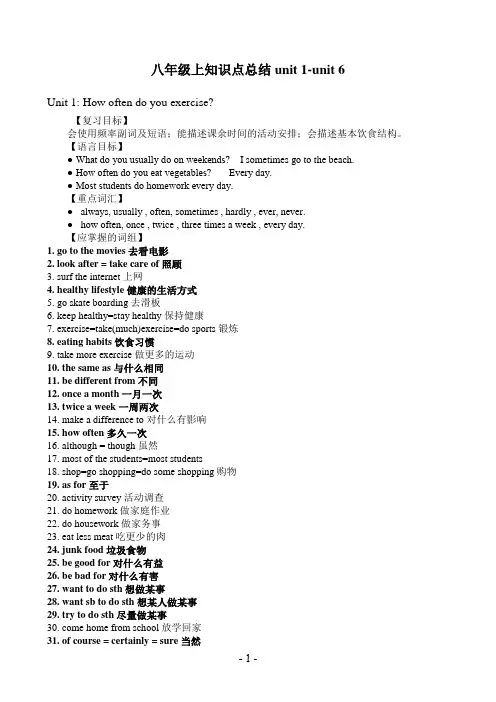
八年级上知识点总结unit 1-unit 6Unit 1: How often do you exercise?【复习目标】会使用频率副词及短语;能描述课余时间的活动安排;会描述基本饮食结构。
【语言目标】● What do you usually do on weekends?I sometimes go to the beach.● How often do you eat vegetables?Every day.● Most students do homework e very day.【重点词汇】●always, usually , often, sometimes , hardly , ever, never.●how often, once , twice , three times a week , every day.【应掌握的词组】1. go to the movies 去看电影2. look after = take care of 照顾3. surf the internet 上网4. healthy lifestyle 健康的生活方式5. go skate boarding 去滑板6. keep healthy=stay healthy 保持健康7. exercise=take(much)exercise=do sports锻炼8. eating habits 饮食习惯9. take more exercise 做更多的运动10. the same as 与什么相同11. be different from 不同12. once a month一月一次13. twice a week一周两次14. make a difference to 对什么有影响15. how often 多久一次16. although = though虽然17. most of the students=most students18. shop=go shopping=do some shopping 购物19. as for至于20. activity survey活动调查21. do homework做家庭作业22. do housework做家务事23. eat less meat吃更少的肉24. junk food垃圾食物25. be good for 对什么有益26. be bad for对什么有害27. want to do sth 想做某事28. want sb to do sth想某人做某事29. try to do sth 尽量做某事30. come home from school放学回家31. of course = certainly = sure当然32. get good grades取得好成绩33. some advice34. hardly=not nearly / almost not几乎不35. keep/be in good health保持健康36.be stressed out紧张的,有压力的37. take a vacation 去度假48.get back 回来【应掌握的句子】1. How often do you exercise? 你(你们)多久锻炼一次身体?How often + 助动词do(does或did) + 主语 + do sth.? 疑问词how often是问频率(多久一次),(在这里助动词do(does或did) 是起帮助构成疑问的作用)与一般现在时或一般过去时连用,回答一般是用表示频率的副词,如:once, twice, three t imes…, sometimes, often, quite often, usually, always, never, every day, once a week , twice a month , three times a month 等。
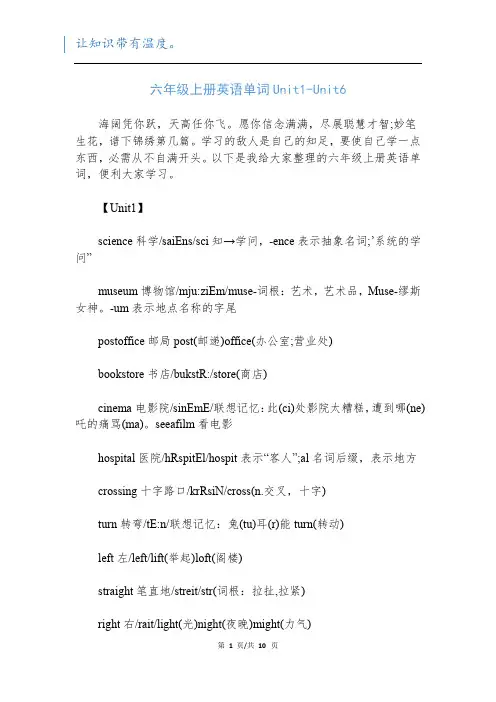
六年级上册英语单词Unit1-Unit6海阔凭你跃,天高任你飞。
愿你信念满满,尽展聪慧才智;妙笔生花,谱下锦绣第几篇。
学习的敌人是自己的知足,要使自己学一点东西,必需从不自满开头。
以下是我给大家整理的六年级上册英语单词,便利大家学习。
【Unit1】science科学/saiEns/sci知→学问,-ence表示抽象名词;’系统的学问”museum博物馆/mju:ziEm/muse-词根:艺术,艺术品,Muse-缪斯女神。
-um表示地点名称的字尾postoffice邮局post(邮递)office(办公室;营业处)bookstore书店/bukstR:/store(商店)cinema电影院/sinEmE/联想记忆:此(ci)处影院太糟糕,遭到哪(ne)吒的痛骂(ma)。
seeafilm看电影hospital医院/hRspitEl/hospit表示“客人”;al名词后缀,表示地方crossing十字路口/krRsiN/cross(n.交叉,十字)turn转弯/tE:n/联想记忆:兔(tu)耳(r)能turn(转动)left左/left/lift(举起)loft(阁楼)straight笔直地/streit/str(词根:拉扯,拉紧)right右/rait/light(光)night(夜晚)might(力气)ask问/B:sk/mask(面具)cask(木桶)sir(对男子的礼貌称呼)先生/sE:/interesting好玩的/intristiN/inter(埋)rest(休息)interest(爱好,爱好)Italian意大利的/itAljEn/restaurant餐馆/restErRN/联想:在饭店休息(rest)时观察,一(a)油桶(u象形)让蚂蚁(ant)爬满pizza比萨饼/pi:tsE/street大街;街道/stri:t/联想:绿化的街道(street),两旁都是树(tree)get到达/get/GPS全球(卫星)定位系统gave(give的过去式)供应;交给/geiv/feature特点/fi:tFE/feat(做)+ure(构成抽象名词)→做事的状态→做事特征。
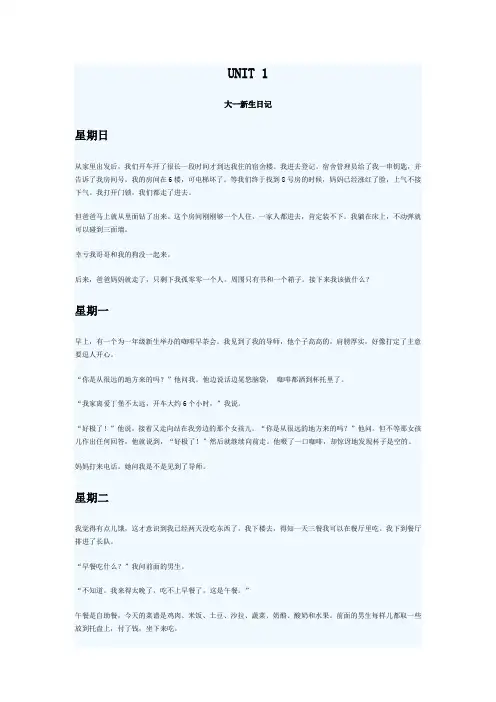
UNIT 1大一新生日记星期日从家里出发后,我们开车开了很长一段时间才到达我住的宿舍楼。
我进去登记。
宿舍管理员给了我一串钥匙,并告诉了我房间号。
我的房间在6楼,可电梯坏了。
等我们终于找到8号房的时候,妈妈已经涨红了脸,上气不接下气。
我打开门锁,我们都走了进去。
但爸爸马上就从里面钻了出来。
这个房间刚刚够一个人住,一家人都进去,肯定装不下。
我躺在床上,不动弹就可以碰到三面墙。
幸亏我哥哥和我的狗没一起来。
后来,爸爸妈妈就走了,只剩下我孤零零一个人。
周围只有书和一个箱子。
接下来我该做什么?星期一早上,有一个为一年级新生举办的咖啡早茶会。
我见到了我的导师,他个子高高的,肩膀厚实,好像打定了主意要逗人开心。
“你是从很远的地方来的吗?”他问我。
他边说话边晃悠脑袋,咖啡都洒到杯托里了。
“我家离爱丁堡不太远,开车大约6个小时,”我说。
“好极了!”他说,接着又走向站在我旁边的那个女孩儿。
“你是从很远的地方来的吗?”他问。
但不等那女孩儿作出任何回答,他就说到,“好极了!”然后就继续向前走。
他啜了一口咖啡,却惊讶地发现杯子是空的。
妈妈打来电话。
她问我是不是见到了导师。
星期二我觉得有点儿饿,这才意识到我已经两天没吃东西了。
我下楼去,得知一天三餐我可以在餐厅里吃。
我下到餐厅排进了长队。
“早餐吃什么?”我问前面的男生。
“不知道。
我来得太晚了,吃不上早餐了。
这是午餐。
”午餐是自助餐,今天的菜谱是鸡肉、米饭、土豆、沙拉、蔬菜、奶酪、酸奶和水果。
前面的男生每样儿都取一些放到托盘上,付了钱,坐下来吃。
我再也不觉得饿了。
妈妈打电话来。
她问我有没有好好吃饭。
星期三早上9点钟我要去听一个讲座。
我醒时已经8:45了。
竟然没有人叫我起床。
奇怪。
我穿好衣服,急匆匆地赶到大讲堂。
我在一个睡眼惺忪的女生旁边坐下。
她看了看我,问:“刚起床?”她是怎么看出来的?讲座进行了1个小时。
结束时我看了看笔记,我根本就看不懂自己写的字。
那个女生名叫苏菲,和我一样,也是英语文学专业的学生。
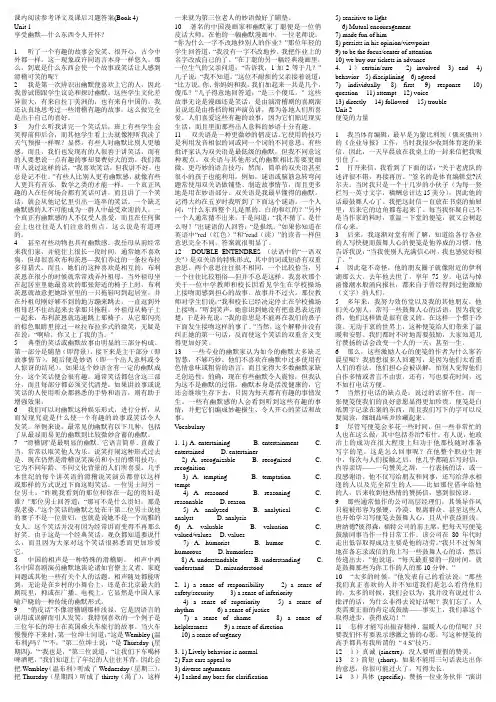
课内阅读参考译文及课后习题答案(Book 4)Unit 1享受幽默—什么东西令人开怀?1 听了一个有趣的故事会发笑、很开心,古今中外都一样。
这一现象或许同语言本身一样悠久。
那么,到底是什么东西会使一个故事或笑话让人感到滑稽可笑的呢?2 我是第一次辨识出幽默便喜欢上它的人,因此我曾试图跟学生议论和探讨幽默。
这些学生文化差异很大,有来自拉丁美洲的,也有来自中国的。
我还认真地思考过一些滑稽有趣的故事。
这么做完全是出于自己的喜好。
3 为什么听我讲完一个笑话后,班上有些学生会笑得前仰后合,而其他学生看上去就像刚听我读了天气预报一样呢?显然,有些人对幽默比别人更敏感。
而且,我们也发现有的人很善于讲笑话,而有的人要想说一点有趣的事却要费好大的劲。
我们都听人说过这样的话:―我喜欢笑话,但我讲不好,也总是记不住。
‖有些人比别人更有幽默感,就像有些人更具有音乐、数学之类的才能一样。
一个真正风趣的人在任何场合都有笑话可讲,而且讲了一个笑话,就会从他记忆里引出一连串的笑话。
一个缺乏幽默感的人不可能成为一群人中最受欢迎的人。
一个真正有幽默感的人不仅受人喜爱,而且在任何聚会上也往往是人们注意的焦点。
这么说是有道理的。
4 甚至有些动物也具有幽默感。
我岳母从前经常来我们家,并能住上很长一段时间。
通常她不喜欢狗,但却很喜欢布利茨恩—我们养过的一条拉布拉多母猎犬。
而且,她们的这种喜欢是相互的。
布利茨恩在很小的时候就常常戏弄外祖母,当外祖母坐在起居室里她最喜欢的那张舒适的椅子上时,布利茨恩就故意把她卧室里的一只拖鞋叼到起居室,并在外祖母刚好够不到的地方蹦来跳去,一直逗到外祖母忍不住站起来去拿那只拖鞋。
外祖母从椅子上一起来,布利茨恩就迅速跳上那椅子,从它那闪亮的棕色眼睛里掠过一丝拉布拉多式的微笑,无疑是在说:―啊哈,你又上了我的当。
‖5 典型的笑话或幽默故事由明显的三部分构成。
第一部分是铺垫(即背景),接下来是主干部分(即故事情节),随后便是妙语(即一个出人意料或令人惊讶的结尾)。
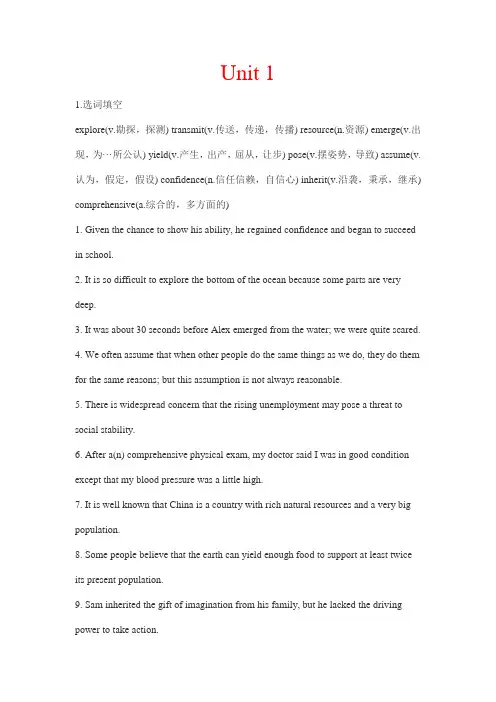
Unit 11.选词填空explore(v.勘探,探测) transmit(v.传送,传递,传播) resource(n.资源) emerge(v.出现,为···所公认) yield(v.产生,出产,屈从,让步) pose(v.摆姿势,导致) assume(v.认为,假定,假设) confidence(n.信任信赖,自信心) inherit(v.沿袭,秉承,继承) comprehensive(a.综合的,多方面的)1. Given the chance to show his ability, he regainedconfidence and began to succeed in school.2. It is so difficult to explore the bottom of the ocean because some parts are very deep.3. It was about 30 seconds before Alex emerged from the water; we were quite scared.4. We often assume that when other people do the same things as we do, they do them for the same reasons; but this assumption is not always reasonable.5. There is widespread concern that the rising unemployment may pose a threat to social stability.6. After a(n) comprehensive physical exam, my doctor said I was in good condition except that my blood pressure was a little high.7. It is well known that China is a country with rich natural resources and a very big population.8. Some people believe that the earth can yield enough food to support at least twice its present population.9. Saminherited the gift of imagination from his family, but he lacked the driving power to take action.10. A bee that has found honey is able to transmit to other bees the information they need in order to collect the honey.2.15选10attain赢得,获得,得到fascinating迷人的,吸引人fulfill履行,执行pursue追求,致力于available可获得的可利用的qualify使合适,合格raise提升,增加passion强烈的爱好,热爱virtually实际上classify分类归类acquire获得,取得,学到fashionable流行的especially特别的sample样品,标本prosperous繁荣的University students come from different parts of the country with various purposes. However, a closer look at their reasons for studying at the university will enable us to (1)classify them roughly into three groups: those who have a(n) (2)passion for learning, those who wish to (3)attain a bright future, and those who learn with no definite purpose. Firstly, there are many students who learn simply because they (4)pursue their goal of learning. Some read a wealth of British and American novels because they are keenly interested in literature. Others sit in front of thecomputer screen, working on a new program, (5)virtually day and night, because they find some computer programs (6)fascinating, and they dream of becoming a "Bill Gates" one day. Secondly, there are students who work hard mainly for a better and more(7)prosperous future. It seems that the majority of students fall into this group. After admission to the university, they read books after books to (8)acquire knowledge from all of the resources which are (9)available to them, and finally, to succeed in the future job market. Thirdly, there are still some students who learn without a clear goal. They take courses, finish homework, enjoy life on campus, but don't want to(10)sample anything new or challenging. They have no idea what they will be doing after college. And they may end up with nothing in their lives.3.选词组open the door to 给···以机会in advance 预先,提前all at once 同时,一下子reap the benefits (of) 得享(某事物)的好处make the most of最大限度的利用某物over time逐渐地,慢慢地get by过活,活的去stand a chance (of)有(做成某事)的希望remind ... of 使某人想起take pleasure in乐于做某事1. My familygot by on my father's unemployment benefit after he lost his job.2. Many subway riders read books or listen to music in order to make the most of their time on the way to work.3. In order to make sure he would be able to attend the meeting, I called him up two weeksin advance.4. Experts say our company is amazing in that sales have been increasing steadily over time .5. In order to reap the benefits of the physical exercise, you have to exercise regularly, and for at least half an hour each time.6. They all tried to talk all at once , but I couldn't hear anything they said.7. Yellow flowers in the field always remindme of my childhood in the countryside.8. We have been practicing for so long and so hard that our team should stand a chance ofwinning the game.9. Research on genes will open the door to exciting new medical treatments.10. Every one of you has made a contribution and I take pleasure in acknowledging what each of you has done to make this academic convention such a success.4.汉译英孔子是中国历史上著名的思想家、教育家,是儒家学派(Confucianism)的创始人,被尊称为古代的"圣人"(sage)。
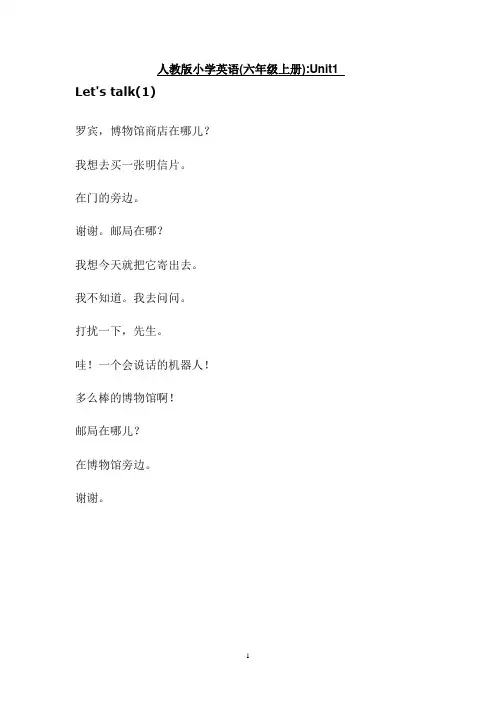
Let's talk(1)罗宾,博物馆商店在哪儿?我想去买一张明信片。
在门的旁边。
谢谢。
邮局在哪?我想今天就把它寄出去。
我不知道。
我去问问。
打扰一下,先生。
哇!一个会说话的机器人!多么棒的博物馆啊!邮局在哪儿?在博物馆旁边。
谢谢。
Let's talk(2)多么有趣的电影!是的,但是现在我饿了。
我知道一家非常棒的意大利餐厅。
我喜欢吃披萨!餐厅在哪儿?它在公园附近的东方街上。
我们怎么去那儿?在书店左转。
然后在医院右转。
好的。
我们出发!Read and write罗宾有导航功能!吴一凡的祖父给了罗宾一个新的功能。
现在它有了导航功能。
他现在能够帮助男孩们找到意大利餐厅。
我们现在在电影院的前面。
直走,然后在书店那里左转。
请跟我走!远吗?不远。
我们现在在医院的后面。
现在我们右转,然后再右转一次。
餐厅在那儿!我的新导航功能起作用了!是的!我会去告诉祖父。
但是让我们先吃饭吧。
我太饿了!Let's talk(1)早上好,史密斯老师!你们好,孩子们。
你们今天来得很早。
你们怎么来学校的?通常我走路来。
有时我也会坐公交车来。
我通常骑自行车来。
你怎么来学校,史密斯老师?开车?有时会,但是我通常走路来。
那是个很好的锻炼方式。
麦克、艾米和史密斯老师怎么来学校的?Let's talk(2)约翰先生,我怎么去复兴医院?去那边乘57路公交车。
谢谢。
哇!这么多自行车照片!这些照片来自我在美国的表弟。
这是什么?一个头盔。
在美国,骑自行车的人必须带(头盔)。
我知道了。
哦,公交车来了!再见,约翰先生。
嗨,别闯红灯!哦,对!谢谢。
我必须注意交通信号灯!关于骑自行车你从对话中学到了什么?Read and write不同的去学校的方法在德国慕尼黑,一些孩子走路去学校。
在美国阿拉斯加,天经常下雪。
一些孩子乘雪橇去学校。
特别快。
在中国江西,一些孩子每天摆渡去学校。
在苏格兰帕帕韦斯特雷岛,孩子们也是摆渡去学校。
但是在2009年,他们开始乘飞机去学校,因为渡船已经不工作了。
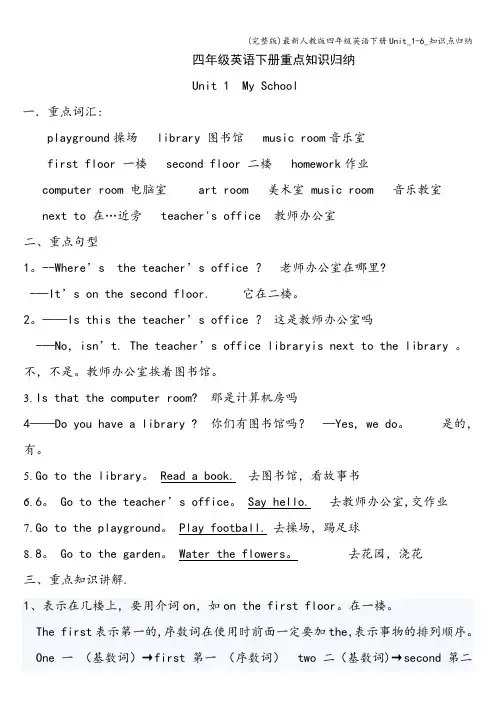
四年级英语下册重点知识归纳Unit 1 My School一.重点词汇:playground操场 library 图书馆 music room音乐室first floor 一楼 second floor 二楼 homework作业computer room 电脑室 art room 美术室 music room 音乐教室next to 在…近旁 teacher's office 教师办公室二、重点句型1。
--Where’s the teacher’s office ?老师办公室在哪里?-—It’s on the second floor. 它在二楼。
2。
——Is this the teacher’s office ?这是教师办公室吗-—No,isn’t. The teacher’s office libraryis next to the library 。
不,不是。
教师办公室挨着图书馆。
3.Is that the computer room? 那是计算机房吗4——Do you have a library ? 你们有图书馆吗?—Yes, we do。
是的,有。
5.Go to the library。
Read a book. 去图书馆,看故事书6.6。
Go to the teacher’s office。
Say hello. 去教师办公室,交作业7.Go to the playground。
Play football. 去操场,踢足球8.8。
Go to the garden。
Water the flowers。
去花园,浇花三、重点知识讲解.1、表示在几楼上,要用介词on,如on the first floor。
在一楼。
The first表示第一的,序数词在使用时前面一定要加the,表示事物的排列顺序。
One 一(基数词)→first 第一(序数词) two 二(基数词)→second 第二(序数词)2、介绍离自己近的事物时用this is …。
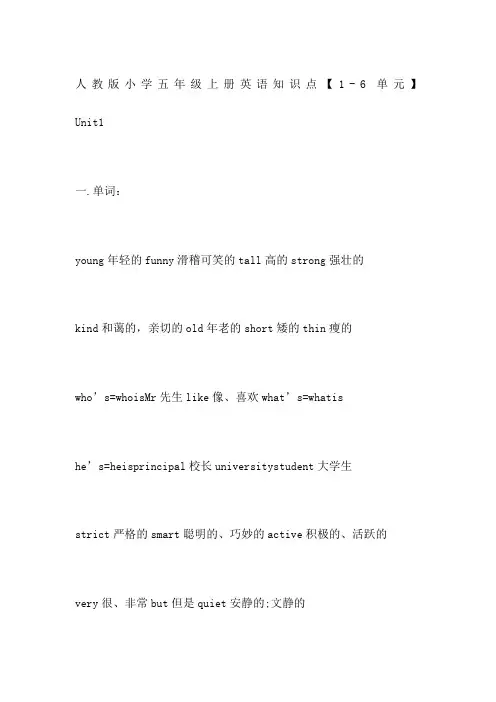
人教版小学五年级上册英语知识点【1-6单元】Unit1一.单词:young年轻的funny滑稽可笑的tall高的strong强壮的kind和蔼的,亲切的old年老的short矮的thin瘦的who’s=whoisMr先生like像、喜欢what’s=whatishe’s=heisprincipal校长universitystudent大学生strict严格的smart聪明的、巧妙的active积极的、活跃的very很、非常but但是quiet安静的;文静的she’s=sheis二.句子:1.A:Who’syourEnglishteacher你的英语老师是谁B:MrCarter.卡特先生.2.He’sfromCanada.他来自加拿大。
3.A:What’shelike他什么样B:He’stallandstrong.他又高又壮。
He’sveryfunny.他很滑稽。
(Who,What引导的特殊疑问句,用来对不熟悉的老师进行问答:Who's+某人What'she/shelikeHe/Sheis+与身体特征和性格特征有关的形容词。
)4.A:W ho’sthatyounglady/那个年轻的女士是谁B:She’sourprincipal.她是我们的校长。
5.Ihaveanewmathteacher.我有一位新数学老师。
6.Herclassissomuchfun.她的课非常有趣。
7.She’sauniversitystudent.她是一名大学生。
8.A:Isshequiet她很安静吗B:No,sheisn’t.She’sveryactive.不是的。
她很活跃的。
(Is引导的一般疑问句,谈论某位老师是否具有某方面的特征:Ishe/she+与身体特征和性格特征有关的形容词,回答用:Yes,he/sheis.No,he/sheisn't.)9.A:Isshestrict她很严格么B:Yes,sheis,butshe’sverykind.是的,但她很和蔼的。
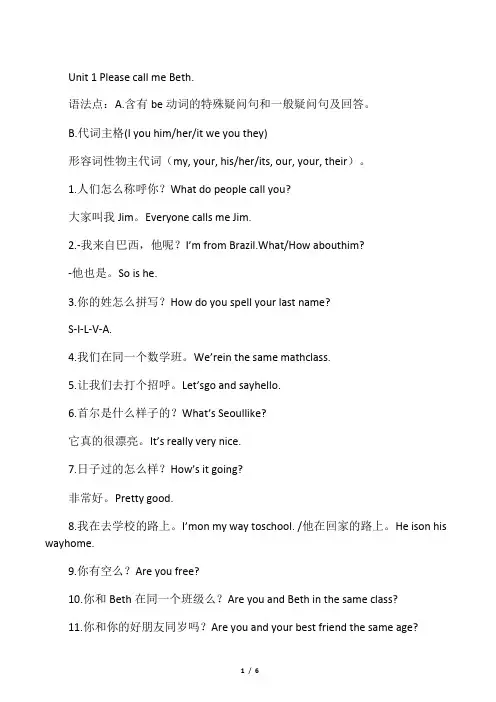
Unit 1 Please call me Beth.语法点:A.含有be动词的特殊疑问句和一般疑问句及回答。
B.代词主格(I you him/her/it we you they)形容词性物主代词(my, your, his/her/its, our, your, their)。
1.人们怎么称呼你?What do people call you?大家叫我Jim。
Everyone calls me Jim.2.-我来自巴西,他呢?I’m from Brazil.What/How abouthim?-他也是。
So is he.3.你的姓怎么拼写?How do you spell your last name?S-I-L-V-A.4.我们在同一个数学班。
We’rein the same mathclass.5.让我们去打个招呼。
Let’sgo and sayhello.6.首尔是什么样子的?What’s Seoullike?它真的很漂亮。
It’s really very nice.7.日子过的怎么样?How’s it going?非常好。
Pretty good.8.我在去学校的路上。
I’mon my way toschool. /他在回家的路上。
He ison his wayhome.9.你有空么?Are you free?10.你和Beth在同一个班级么?Are you and Beth in the same class?11.你和你的好朋友同岁吗?Are you and your best friend the same age?12.一会见。
See you later.明天见。
See you tomorrow.13.祝你愉快。
/祝你度过快乐的一天。
Have a good day.*14. Name is an important part of your identity.名字是你身份的重要组成部分。
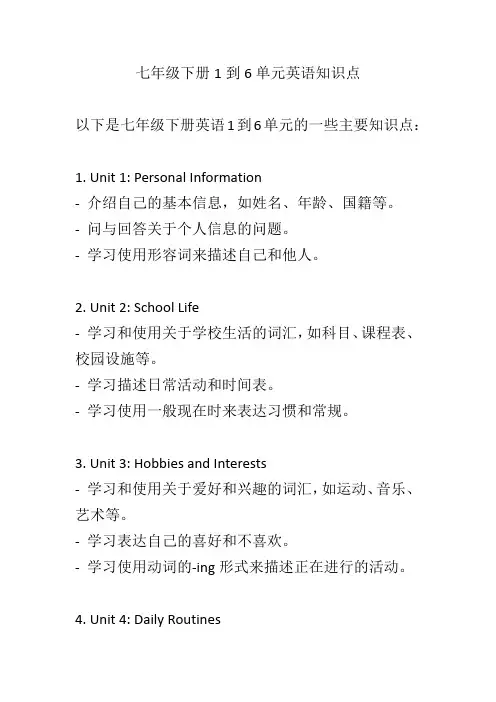
七年级下册1到6单元英语知识点
以下是七年级下册英语1到6单元的一些主要知识点:
1. Unit 1: Personal Information
-介绍自己的基本信息,如姓名、年龄、国籍等。
-问与回答关于个人信息的问题。
-学习使用形容词来描述自己和他人。
2. Unit 2: School Life
-学习和使用关于学校生活的词汇,如科目、课程表、校园设施等。
-学习描述日常活动和时间表。
-学习使用一般现在时来表达习惯和常规。
3. Unit 3: Hobbies and Interests
-学习和使用关于爱好和兴趣的词汇,如运动、音乐、艺术等。
-学习表达自己的喜好和不喜欢。
-学习使用动词的-ing形式来描述正在进行的活动。
4. Unit 4: Daily Routines
-学习和使用关于日常生活的词汇,如起床、吃早餐、上学等。
-学习描述日常活动的顺序和时间。
-学习使用一般现在时来描述日常例行事务。
5. Unit 5: Food and Health
-学习和使用关于食物和健康的词汇,如水果、蔬菜、饮食习惯等。
-学习表达食物的喜好和不喜欢。
-学习使用情态动词can和should来表达能力和建议。
6. Unit 6: Travel and Transportation
-学习和使用关于旅行和交通的词汇,如旅游景点、交通工具等。
-学习描述旅行计划和行程。
-学习使用一般将来时来表达将来的计划和打算。
五年级上册英语1-6单词表Unit 1 第一单元clever [ˈklevə(r)] 聪明的careless [ˈkeələs] 粗心的polite [pəˈlaɪt] 有礼貌的quiet [ˈkwaɪət] 安静的cute [kjuːt] 漂亮的,可爱的friendly [ˈfrendli] 友好的helpful [ˈhelpfl] 肯帮忙的active [ˈæktɪv] 活跃的popular [ˈpɒpjələ(r)] 受欢迎的talk [tɔːk] 说话party [ˈpɑːti] 聚会all [ɔːl] 全部but [bət , bʌt] 但是sometimes [ˈsʌmtaɪmz] 有时bark [bɑːk] 吠,叫forget [fəˈɡet] 忘记with [wɪð] 同......一起Unit 2 第二单元wear glasses [weə(r) ˈɡlɑːsɪz] 戴眼镜slim [slɪm] 苗条的curly [ˈkɜːli] 卷曲的straight [streɪt] 直的nice [naɪs] 好的young [jʌŋ] 年轻的teach [jʌŋ] 教guess [ɡes] 猜has [həz] 有Unit 3 第三单元animal ['ænɪm(ə)l] 动物elephant ['elɪf(ə)nt] 大象panda ['pændə] 熊猫horse [hɔːs] 马cow [kaʊ] 奶牛pig [pɪg] 猪sheep [ʃiːp] 绵羊bee [biː] 蜜蜂farm [fɑːm] 农场fast [fɑːst] 快的;迅速地why [waɪ] 为什么lovely [ˈlʌvli] 可爱的butterfly [ˈbʌtəflaɪ] 蝴蝶Unit 4 第四单元exercise book[ˈeksəsaɪz bʊk] 练习本pencil sharpener[ˈpensl ʃɑːpnə(r)] 铅笔刀a pair of scissors 一把剪刀pencil box [ˈpensl bɒks] 铅笔盒a box of crayons 一盒蜡笔please [pliːz] 请only [ˈəʊnli] 只,仅仅also [ˈɔːlsəʊ] 也saleswoman [ˈseɪlzwʊmən] 女售货员great [ɡreɪt] 好极了love [lʌv] 喜欢how much [haʊmʌtʃ] (价钱)多少?a lot [əlɒt] 很多Unit 5 第五单元wonderful [ˈwʌndəfl] 精彩的cool [kuːl] 酷的fantastic [fænˈtæstɪk] 极好的cartoons [kɑːˈtuːnz] 动画片news shows 新闻节目nature shows 自然节目Unit 6 第六单元chore [tʃɔː(r)] 家务clean the room [kliːn ðəruːm] 打扫房间make the bed [meɪk ðəbed] 整理床铺take out the rubbish 倒垃圾wash clothes [wɒʃkləʊðz] 洗衣服tidy the desk 清理书桌sweep the floor [swiːp ðəflɔː(r)] 扫地call [kɔːl] 打电话给......。
人教版小学五年级上册英语知识点【1-6单元】Unit1一.单词:young年轻的funny滑稽可笑的tall高的strong强壮的kind和蔼的,亲切的old年老的short矮的thin瘦的who’s=whoisMr先生like像、喜欢what’s=whatishe’s=heisprincipal校长universitystudent大学生strict严格的smart聪明的、巧妙的active积极的、活跃的very很、非常but但是quiet安静的;文静的she’s=sheis二.句子:1.A:Who’syourEnglishteacher你的英语老师是谁B:MrCarter.卡特先生.2.He’sfromCanada.他来自加拿大。
3.A:What’shelike他什么样B:He’stallandstrong.他又高又壮。
He’sveryfunny.他很滑稽。
(Who,What引导的特殊疑问句,用来对不熟悉的老师进行问答:Who's+某人What'she/shelikeHe/Sheis+与身体特征和性格特征有关的形容词。
)4.A:W ho’sthatyounglady/那个年轻的女士是谁B:She’sourprincipal.她是我们的校长。
5.Ihaveanewmathteacher.我有一位新数学老师。
6.Herclassissomuchfun.她的课非常有趣。
7.She’sauniversitystudent.她是一名大学生。
8.A:Isshequiet她很安静吗B:No,sheisn’t.She’sveryactive.不是的。
她很活跃的。
(Is引导的一般疑问句,谈论某位老师是否具有某方面的特征:Ishe/she+与身体特征和性格特征有关的形容词,回答用:Yes,he/sheis.No,he/sheisn't.)9.A:Isshestrict她很严格么B:Yes,sheis,butshe’sverykind.是的,但她很和蔼的。
六年级上册Unit1-Unit6重点词汇与句型Unit 1 How can I get there?重点词汇:hospital 医院cinema 电影院post office 邮局bookstore 书店museum 博物馆go straight 直走turn right 右转turn left 左转crossing 十字路口science 科学turn 转弯left 左straight 笔直地right 右重点句型:1. —Where is the...?……在哪里?—It's near/next to the...它在……附近/ 与……相邻。
2.How can I get to the...?我怎么去……?3.Turn right./Turn left./Go straight.右转。
/左转。
/直走。
问(ask)路和指(tell)路英语中常见问路的表达方法:Excuse me, where is+地点, please?Excuse me, how can I get to+地点?Excuse me, can you tell me where+地点+is?英语中常见指路的表达方法:It's+表示位置的短语.Turn left/right at+地点.Go straight along+地点.常见的方位介词及短语:1. in表示“在……里面”。
2. on表示“在……上面”,但两者互相接触。
3. under表示“在……下方”。
4. behind表示“在……后面”。
5. in front of表示“在……前面”,正好与behind相反。
6. beside 表示“在……旁边”。
7. above 表示“在……上面”,但两者不接触。
8. between 表示“在……中间”。
9. near表示“在……附近”。
10. next to 表示“在……附近”,相当于near。
11. in the middle of 表示“在......中间”12. over 在……上面;从……上方;穿越;over there 在那里六年级上册Unit 2 Ways to go to school重点词汇:bus 公共汽车plane 飞机taxi 出租汽车ship (大)船subway 地铁train 火车by (表示方式)乘on foot 不行stop 停下slow 慢的down 减少;降低slow down 慢下来重点句型:1.How do you get to...? 你怎么去……?2.I usually/often/sometimes come to school on foot/by...我通常/经常/有时候步行/乘……来学校。
上教版小学单词表上教版一年级上册单词Unit 11. hello 喂;你好2. hi 嗨,你好3. goodbye * 再见4. morning 早上;上午5. afternoon 下午6. I 我7. am 是8. school * 学校9. day * 一天;一日Unit 21. give 给2. me 我3. a 一;一个4. please 请5. thank 谢谢6. you 你;你们7. book 书8. ruler 尺子9. pencil 铅笔10. rubber 橡皮11. on * 在(时间)12. Sunday * 星期天;周日13. how * 多么;怎样;如何14. nice * 好看的;美好的Unit 31. this 这;这个2. is 是3. my 我的4. face 脸;面孔5. mouth 嘴巴6. nose 鼻子7. eye 眼睛8. ear 耳朵9. touch * 触;碰;摸10. your * 你的;你们的11. picture * 图画12. it 它13. look * 看14. no * 不;不是15. not * 不是Unit 41. can 能;能够2. sing 唱;歌唱3. dance 跳舞4. read 读;朗读5. draw 画画6. what 什么7. do 做Unit 51. who 谁2. she 她3. grandmother 奶奶;外婆;(外)祖母4. he 他5. father 爸爸;父亲6. grandfather 爷爷;外公;(外)祖父7. mother 妈妈;母亲8. yes * 是;对Unit 61. tall 高的2. short 矮的3. fat 胖的4. thin 瘦的5. classmate * 同学6. friend * 朋友Unit 71. how many 多少2. three 三3. two 二4. six 六5. one 一6. four 四7. five 五8. let’s * 让我们9. count * 数数Unit 81. how 怎样;如何2. weather 天气3. cloudy 多云的4. sunny 阳光明媚的5. rainy 有雨的;多雨的6. windy 有风的;多风的7. hot * 炎热的8. go * 去9. to * 到;向10. beach * 沙滩;海滩Unit 91. may 可以2. have 有;拥有3. pie 果馅饼4. hamburger 汉堡包5. pizza 比萨饼6. cake 蛋糕7. snack * 小吃;点心8. bar * 小吃部Unit 101. moo * (牛叫声)2. that 那;那个3. cow 母牛;奶牛4. chick 小鸡5. peep * (鸡叫声)6. duck 鸭子7. pig 猪8. oink * (猪叫声)9. quack * (鸭叫声)10. cut * 剪下;切下11. stick * 粘贴Unit 111. monkey 猴子2. bear 熊3. panda 熊猫4. tiger 老虎Unit 121. colour 颜色;涂色2. kite * 风筝3. where 在哪里4. in 在......里面5. tree * 树;树木6. yellow 黄色的7. red 红色的8. blue 蓝色的9. green 绿色的10. small 小的11. go * 发出(某种声音)12. big 大的上教版一年级下册单词Unit 11. see 看见2. frog 青蛙3. rabbit 兔子4. bee 蜜蜂5. bird 鸟Unit 21. listen * 听2. hear 听见3. sheep 绵羊(复数sheep)4. hen 母鸡5. dog 狗6. cat 猫7. home * 家Unit 31. smell 闻(......的气味)2. taste 尝(......的味道)3. rice 米饭4. soup 汤5. egg 蛋6. noodles 面条7. yummy * 美味的8. restaurant * 餐馆9. help * 帮助10. stand up * 站起来11. flower * 花Unit 41. toy * 玩具2. like 喜欢3. ball 球4. doll 玩具娃娃5. kite 风筝6. bicycle 自行车7. toy shop * 玩具店8. super * 超级的,顶好的Unit 51. food * 食物2. sweet 糖果;甜的3. jelly 果冻4. ice cream 冰淇淋5. biscuit 饼干6. teatime * 茶点时间7. for * 给......8. and * 和9. sorry * 对不起;抱歉10. very much * 非常Unit 61. drink * 饮料2. water 水3. cola 可乐4. juice 果汁5. milk 牛奶6. birthday * 生日7. party * 聚会;派对8. happy * 快乐的9. song * 歌曲Unit 71. season * 季节2. spring 春天3. summer 夏天4. autumn 秋天5. winter 冬天6. white 白色的7. grass 草8. watermelon 西瓜Unit 81. how 怎样;如何2. weather 天气3. cloudy 多云的4. sunny 阳光明媚的5. rainy 有雨的;多雨的6. windy 有风的;多风的7. hot * 炎热的8. go * 去9. to * 到;向10. beach * 沙滩;海滩Unit 91. clothes * 衣服2. need 需要3. new 新的4. T-shirt T恤衫5. dress 连衣裙6. shorts 短裤7. blouse 女士衬衫8. don't * (do的否定形式)Unit 101. activity * 活动2. ride 骑(车)3. skip 跳绳4. play 踢(球);玩5. fly 放(风筝)6. playtime * 游戏时间7. football * 足球8. rope * 绳子Unit 111. new year * 新年2. gift 礼物3. card 卡片4. firecracker 鞭炮;爆竹5. firework 烟火;烟花6. make * 制作7. write * 写8. fold * 折9. Miss * 小姐10. shopping * 购物Unit 121. boy 男孩2. wolf 狼3. wolves 狼(复数)4. farmer 农夫5. narrator * 旁白员;叙述者6. come * 来7. where * 哪里8. bad * 坏的9. poor * 可怜的10. tell * 说;告诉11. lie * 谎话;谎言12. run away * 逃跑上教版二年级上册单词Unit 11. good 好的2. evening 晚上;傍晚3. night 夜晚4. day * 一天;一日5. mum 妈妈6. today * 今天7. very well * 很好;非常好8. ant * 蚂蚁9. bear * 熊Unit 21. tall 高的2. short 矮的3. boy 男孩4. girl 女孩5. no 不;不是6. yes 对7. name * 名字Unit 31. sorry 对不起;请原谅2. seven 七3. eight 八4. nine 九5. ten 十6. elephant * 大象Unit 41. swim 游泳2. run 跑3. write 书写;写字4. fly 飞;飞翔5. ride a bicycle * 骑自行车6. can't * 不能;不会7. giraffe * 长颈鹿Unit 51. family 家;家庭2. brother 哥哥;弟弟3. sister 姐姐;妹妹4. friend 朋友5. young 年轻的6. old 老的7. insect * 昆虫8. jellyfish * 水母Unit 61. hair 头发2. head 头3. your 你的4. long 长的5. now * 现在6. look 看7. kangaroo * 袋鼠8. lion * 狮子9. has * 有Unit 71. playground * (学校或公园中的)游戏场2. slide 滑梯3. swing 秋千4. seesaw 跷跷板5. nightingale * 夜莺Unit 81. room * 房间2. put 放3. the (表示特指)4. bag 包5. dad 爸爸6. box 盒子;箱子7. on 在......上8. chair 椅子9. desk 书桌10. car * 小汽车11. look at 看12. pencil case * 铅笔盒;铅笔袋13. ox * 公牛14. work 劳动;干活15. sleep * 睡觉Unit 91. dinner * 正餐;晚餐2. ready * 准备好3. plate 盘子;碟子4. chopsticks 筷子5. bowl 碗6. spoon 匙;调羹7. queen bee * 蜂王;蜂后8. fly around * 飞来飞去9. run around * 跑来跑去Unit 101. sky * 天空2. moon 月亮3. bright 明亮的4. sun 太阳5. star 星6. snake * 蛇7. king * 国王Unit 111. forest 森林2. fox 狐狸3. meat 肉类4. hippo 河马5. wild * 野生的6. animal * 动物7. cute * 可爱的8. wow * (表示惊奇)哇,呀9. so * 这么;那么10. dove * 鸽子11. swan * 天鹅Unit 121. street * 大街;街道2. don't 不要(=do not)(do not的缩写形式)3. do not 不要(=don't)4. pick 采;摘5. flower 花6. climb 爬7. tree 树8. cut 切;割;剪9. park 公园10. nice * 令人愉快的;友好的11. beautiful * 美丽的12. cry 哭;哭泣13. yak * 牦牛14. zebra * 斑马上教版二年级下册单词Unit 11. are 是;就是2. they 他们;她们;它们3. brown 棕色的;褐色的4. white 白色的5. black 黑色的6. and 和;与Unit 21. feel 摸;摸起来2. touch 触摸;碰3. hard 坚硬的4. soft 软的;柔软的5. happy 感到快乐的6. birthday 生日7. for 给8. guess 猜测9. pencil case 铅笔盒;铅笔袋10. open 打开11. wow (表示极大的惊奇)哇,呀12. watch 表;手表Unit 31. train 火车;列车2. ship (大)船3. car 小汽车;轿车4. bus 公共汽车;巴士5. listen 听6. beside 在......旁边7. window 窗户8. outside 在......外面9. can't 不能10. cannot (=can't) 不能Unit 31. thing 东西;物2. doing (do的ing形式)做3. running (run的ing形式)跑步4. skating (skate的ing形式)滑(滑板);滑冰5. hopping (hop的ing形式)单脚跳行6. riding (ride的ing形式)骑;驾驶7. skate 滑(滑板);溜冰8. hop 单脚跳行9. skipping (skip的ing形式)跳绳10. fly (fly的ing形式)飞;飞翔11. swimming (swim的ing形式)游泳12. too 也13. let's 让我们14. let us (=let's)让我们15. together 在一起;共同Unit 41. thing 东西;物2. doing (do的ing形式)做3. running (run的ing形式)跑步4. skating (skate的ing形式)滑(滑板);滑冰5. hopping (hop的ing形式)单脚跳行6. riding (ride的ing形式)骑;驾驶7. skate 滑(滑板);溜冰8. hop 单脚跳行9. skipping (skip的ing形式)跳绳10. fly (fly的ing形式)飞;飞翔11. swimming (swim的ing形式)游泳12. too 也13. let's 让我们14. let us (=let's)让我们15. together 在一起;共同Unit 51. would like (表示愿意、喜欢)2. some 一些3. salad (生吃的)蔬菜色拉4. sure (表示同意)当然5. don't (=do not)(do的否定式)不,勿6. do not (=don't ) (do的否定式)不,勿7. fish 鱼;鱼肉8. chicken 鸡;鸡肉9. nice 令人愉快的10. yummy 美味的Unit 61. zebra 斑马2. giraffe 长颈鹿3. snake 蛇4. elephant 大象5. lion 狮子6. toy shop 玩具店7. toy 玩具Unit 71. ride a bicycle 骑自行车2. fly a kite 放风筝3. make a snowman 堆雪人4. eat 吃5. fruit 水果6. sleeping (sleep的ing形式)睡觉Unit 81. traffic 交通2. rule 规则;规章3. light 灯;电灯4. stop 停止;停下5. go 去;走6. wait 等;等待Unit 91. sweater 毛衣;线衣2. shirt (尤指男式的)衬衫3. coat 外套;大衣4. trousers 裤子5. cold 寒冷的6. warm 温暖的7. woof (狗叫声)汪汪Unit 101. play yo-yo 玩溜溜球2. play cards 打牌3. play football 踢足球Unit 111. Book Day 读书日2. today 今天3. a lot of 许多4. interesting 有趣的5. bookmark 书签6. idea 想法;主意7. tie 系;绑8. about 关于9. robot 机器人Unit 121. Papa Bear 熊爸爸2. Mama Bear 熊妈妈3. Baby Bear 熊宝宝4. go out 外出5. hungry 感到饿的6. thirsty 口渴的7. tired 疲倦的;疲劳的8. house 房屋;房子9. want 要;想要10. milk 牛奶11. bread 面包12. want to 想做(某事)13. bed 床14. little 小的上教版三年级上册单词Unit 11. hello (用于打招呼)喂,你好2. I 我3. Miss 小姐4. Alice 艾丽丝(人名)5. Joe 乔(人名)6. Kitty 凯蒂(人名)7. Peter 彼得(人名)Unit 21. are 是2. fine 健康的;身体很好的3. goodbye 再见4. hi (用于打招呼)喂,你好5. Mr 先生6. Mrs 太太7. thank 谢谢8. you 你;你们9. Ben 本(人名)Unit 31. am 是2. boy 男孩3. girl 女孩4. no 不;不是5. not 不是6. yes 是;对Unit 41. fat 胖的2. friend 朋友3. he 他4. is 是5. my 我的6. she 她7. short 矮的;短的8. tall 高的9. thin 瘦的10. this 这;这个Unit 51. beautiful 美丽的2. brother 哥哥;弟弟3. father 父亲;爸爸4. me 我5. mother 母亲;妈妈7. sister 姐姐;妹妹8. who 谁Unit 61. big 大的2. ear 耳朵3. eye 眼睛4. face 脸;面孔5. hair 头发7. long 长的8. look 看9. mouth 口;嘴巴10. small 小的Unit 71. blackboard 黑板2. clean 把...擦干净;打扫3. close 关上4. door 门5. late 迟到6. look at 看7. open 打开8. please 请9. the 表示特指10. window 窗;窗户11. OK 好的Unit 81. a 一;一个2. an 一;一个3. apple 苹果4. banana 香蕉5. dad 爸6. good 好7. here 这里8. how much (用于问价钱)多少9. it 它10. orange 桔子11. they 他们;她们;它们Unit 91. bed 床2. book 书3. chair 椅子4. desk 书桌5. mum 妈妈6. pen 钢笔7. pencil 铅笔8. ruler 尺子9. schoolbag 书包10. these 这些11. your 你的;你们的12. welcome 欢迎Unit 101. one 一2. two 二3. three 三4. four 四5. five 五6. six 六7. seven 七8. eight 八9. nine 九10. ten 十11. how many (用于问数量)多少12. very good 很好Unit 111. cat 猫2. dog 狗3. fish 鱼4. its 它的5. mouse 老鼠6. mice (复数)老鼠7. rabbit 兔子8. tail 尾巴9. what 什么10. well done 做得真好Unit 121. autumn 秋天2. cold 寒冷的3. cool 凉爽的4. hot 炎热的5. in 在(某段时间)内6. spring 春天7. summer 夏天8. warm 温暖的上教版三年级下册单词Unit 11. black 黑色的2. blue 蓝色的3. red 红色的4. white 白色的5. yellow 黄色的6. green 绿色的7. colour 颜色8. find 发现;找到9. and 和;同10. ball 球11. matter 问题12. mix 混合Unit 21. candy 糖果2. ice cream 雪糕3. lemon 柠檬4. sour 酸的5. sweet 甜的6. taste 味道;尝7. orange 橙子8. how 怎样Unit 31. am 是2. boy 男孩3. girl 女孩4. no 不;不是5. not 不是6. yes 是;对Unit 41. bear 熊2. elephant 象3. monkey 猴子4. panda 熊猫5. tiger 老虎6. lion 狮子7. like 喜欢8. man 男人9. men (复数)男人10. our 我们的11. strong 强壮的;坚固的12. hat 帽子13. old 老的;古老的;旧的14. cute 可爱的Unit 51. robot 机器人2. toy bear 玩具熊3. kite 风筝4. ball 球5. fun 乐趣6. lovely 可爱的7. play 玩8. sorry 对不起9. super 超级的;顶好的Unit 61. biscuit 饼干2. bread 面包3. egg 鸡蛋4. juice 果汁5. milk 牛奶6. water 水7. about 关于;对于8. have 有9. breakfast 早餐10. child 孩子11. children (复数)孩子12. some 一些13. too 也;还14. we 我们Unit 71. dance 跳舞2. paint 用颜料画3. read 阅读4. sing 唱歌5. skate 滑冰6. swim 游泳7. at home 在家8. come in 进来9. sleep 睡觉10. work 工作11. worker 劳动者12. hobby 业余爱好Unit 81. cake 蛋糕2. card 卡;卡片3. noodle 面条4. blow 刮;吹5. cut 剪;砍;切6. birthday 生日7. dear 亲爱的8. for 给;为了9. how old 多少岁10. to 给;向11. together 一起;共同12. wish 愿望;祝愿Unit 91. cow 母牛2. horse 马3. pig 猪4. sheep 绵羊(单复数相同)5. animal 动物6. bye 再见7. farm 农场8. gate 大门9. grass 草10. great 很好的;很棒的11. litter 乱扔(垃圾)12. stone 石头13. throw 扔Unit 101. arm 手臂2. head 头3. body 身体4. foot 脚;足5. feet (复数)脚;足6. hand 手7. leg 腿8. cartoon 漫画Unit 111. flower 花2. photo 照片3. tea 茶4. cup 杯子5. day 天;日6. do 做7. frame 框架8. idea 主意9. love 爱Unit 121. afraid (of) 害怕......2. bad 坏的3. go 去;走4. house 房屋5. little 小的6. make 做7. now 现在8. there 那里9. very 很;非常上教版四年级上册单词Unit 1meet 相识;结识new 新的morning 早晨;上午classmate 同班同学her 她的name 名字sit 坐afternoon 下午his 他的Unit 2run 跑fast 快地;迅速地;快的fly 飞;放飞draw 画画write 写字;书写jump 跳welcome 欢迎woof (狗叫声)汪汪but 但是Unit 3happy 开心的sad 难过的;悲哀的tired 累的;疲惫的hungry 饥饿的full 饱的thirsty 口thirsty 口渴的bird 鸟see 看见bottle 瓶子drink 喝Unit 4any 任何的cousin 表兄弟;表姐妹;堂兄弟;堂姐妹family 家庭parent 父亲;母亲grandparent (外)祖父;(外)祖母son 儿子grandfather(grandpa)(外)祖父;爷爷;外公grandmother(grandma)(外)祖母;奶奶;外婆uncle 叔叔;伯伯;舅舅;姑父;姨父aunt 姑妈;姨妈;伯母;婶婶;舅妈that 那个Unit 5T-shirt T恤衫brown 棕色的;棕色shorts 短裤ride 骑(马;自行车)skirt 短裙dress 连衣裙shirt (男式)衬衫tooth 牙齿(复数teeth)sharp 锋利的;尖的help 帮助a pair of 一条;一副;一双get out 出去Unit 6nurse 护士fireman 消防员(复数firemen)teacher 老师doctor 医生bus driver 公共汽车司机kid 小孩so 如此;很;所以fire 火;火灾people 人;人们job 工作;职业play with 玩……Unit 7school 学校office 办公室busy 忙碌的;繁忙的computer 计算机;电脑many 许多library 图书馆;图书室playground 操场classroom 教室toilet 厕所animal 动物forest 森林pupil 小学生try 尝试first 第一climb trees 爬树Unit 8shop 商店tomato 番茄;西红柿(复数tomatoes)soup 汤potato 土豆(复数potatoes)carrot 胡萝卜thirty 三下fish 鱼;鱼肉meat 肉rice 大米;米饭glasses 眼镜want 想要together 一起magic 神奇的;有魔力的Unit 9need 需要where 哪里in 在……里面box 盒子;箱子give 给plate 盘子;碟子on 在……上面table 桌子lunch 午餐under 在……下面beside 在……旁边kitchen 厨房floor 地板angry 生气的Unit 10around 在……周围;到处home 家street 街道park 公园near 在……附近behind 在……后面supermarket 超市restaurant 餐馆live 住;居住old 古老的;旧的eat 吃nice 美味的;美好的food 食物a lot of 很多;大量的Unit 11shape 形状picture 图画;照片square 正方形circle 圆;圆形star 五角星形;星星rectangle 长方形triangle 三角形today 今天well 好;健康Unit 12weather 天气rainy 多雨的cloudy 多云的windy 风大的;多风的sunny 阳光充足的Sunday 星期天cloud 云rain 雨;下雨sun 太阳wind 风上教版四年级下册单词Unit 11. touch 碰;触碰2. feel 摸起来;感到3. soft 柔软的4. hard 坚硬的5. thick 厚的;粗的6. thin 薄的;细的7. blind 瞎的;失明的8. noise 响声;吵闹声9. young 年轻的Unit 21. smell 闻;嗅2. strawberry 草莓3. or 或者;还是4. watermelon 西瓜5. grape 葡萄6. fox 狐狸7. round 圆的8. purple 紫色的9. wait 等待;等候10. minute 一会儿;分钟11. get 得到12. those 那些Unit 31. rise 升起2. shadow 影子3. noon 中午4. high 高的5. sky 天空6. evening 傍晚;晚上7. again 再;又8. night 夜晚9. moon 月亮10. him 他11. stop 停下12. at noon 在中午13. go down 落下14. at night 在夜晚15. talk a walk 散步Unit 41. subject 学科;科目2. lesson 课3. Chinese (学科)语文4. Maths (学科)数学5. English (学科)英语6. Science (学科)科学7. PE (学科)体育8. Music (学科)音乐9. Art (学科)美术10. timetable 课程表;时间表11. from 从;来自12. a.m 上午13. p.m 下午14. break 休息15. from...to... 从......到......Unit 51. sport 体育运动2. football 足球3. club 俱乐部;兴趣小组4. join 参加;加入5. tell 告诉6. about 关于7. basketball 篮球8. volleyball 排球9. us 我们10. table tennis 乒乓球运动11. play football 踢足球12. play basketball 打篮球13. play volleyball 打排球Unit 61. wonderful 使人愉悦的;绝妙的2. violin 小提琴3. guitar 吉他4. whose 谁的5. piano 钢琴6. city 城市7. bag 袋子8. gold 金子9. all 全部;所有10. play the violin 拉小提琴11. play the guitar 弹吉他Unit 71. o'clock ......点钟2. quarter 一刻钟3. time 时间4. half 半;一半5. wash 洗6. dinner 晚餐;正餐7. start 开始8. catch 捉住9. get up 起床10. brush...teeth 刷牙11. half past ......点半12. have breakfast 吃早餐13. go to school 去上学14. wash...face 洗脸15. have lunch 吃午餐16. have dinner 吃晚餐17. go to bed 上床睡觉Unit 81. week 星期2. Monday 星期一3. with 和......一起4. Tuesday 星期二5. Wednesday 星期三6. Thursday 星期四7. Friday 星期五8. game 游戏9. Saturday 星期六10. Sunday 星期天11. clock 时钟;钟12. play chess 下国际象棋13. at the weekend 在周末14. (be) late for 迟到Unit 91. China 中国2. talk 谈话;说话3. May 五月4. June 六月5. January 一月6. February 二月7. March 三月8. April 四月9. July 七月10. August 八月11. September 九月12. October 十月13. November 十一月14. December 十二月15. email 电子邮件16. hat 帽子17. wear 穿;戴18. yours 你的;你们的19. every year 每年Unit 101. garden 花园2. plant 植物3. leaf 叶子4. leaves 叶子(复数)5. water 给......浇水6. them 晚它们;它们;她们7. grow (使)生长;成长8. seed 种子9. every day 每天Unit 111. song 歌曲2. zoo 动物园3. cinema 电影院4. museum 博物馆5. also 也;还6. have a party 举办聚会Unit 121. ugly 丑的;丑陋的2. duckling 小鸭3. duck 鸭子4. river 河;江5. baby 宝宝;婴儿6. later 后来;以后7. quack (鸭叫声)嘎嘎8. back 背;背部9. away 去别处;朝另一个方向10. swan 天鹅11. into 朝;向;到......里面上教版五年级上册单词Unit 11. future 将来;未来2. want 想要3. pilot 飞行员4. teach 教(课)5. cook 厨师;烹饪6. taxi driver 出租车司机7. job 工作;职业8. singer 歌手9. fall 掉落;落下10. lifeguard 救生员11. save 救;救助;节约12. become 变成;变得13. (be) good at 擅长Unit 21. by (表示方式);靠近2. walk 走;步行3. Ms 女士4. journey 旅程;旅行5. primary school 小学6. underground 地铁7. station 车站8. take 乘坐(交通工具);带领9. after 在......后10. hour 小时11. bus stop 公共汽车站12. by bus 乘公共汽车13. far from 离......远14. on foot 步行15. by bike 骑自行车16. by car 乘小汽车17. get off 下车Unit 31. party 聚会2. when 什么时候3. begin 开始4. bring 带来5. thing 东西;事物6. favourite 最喜欢的7. interesting 有趣的8. hat 帽子9. have fun 尽情玩Unit 41. usually 通常2. often 经常3. visit 看望;拜访;参观4. sometimes 有时5. always 总是;一直6. never 从不7. play sport 做运动8. go shopping 去购物Unit 51. clever 聪明的2. same 相同的3. class 班;班级4. both (两个)都5. cross 穿越;穿过6. carry 背;提;拿7. heavy 重的;沉的8. different 不同的9. bored 无聊的10. word 单词11. easy 容易的12. say 说13. then 然后;那么14. ask 问15. answer 回答16. soon 很快;不久17. each other 互相18. make phone calls 打电话Unit 61. life 生活2. living room 客厅3. bedroom 卧室4. model plane 飞机模型5. kitchen 厨房6. bathroom 浴室;卫生间7. their 他们的;她们的;它们的8. light 灯;光9. watch 观看;观察10. TV 电视;电视机11. before 在......以前12. bedtime 就寝时间13. do...homework 做家庭作业14. turn off 关掉15. watch TV 看电视16. tell a story 讲故事Unit 71. beach 海滩2. enjoy 享受......的乐趣3. sunshine 阳光4. collect 收集5. shell 贝壳6. sea 海7. letter 信8. put 放;安置9. know 知道10. year 年岁;年11. on holiday 度假12. have a good time 玩得高兴Unit 81. outing 远足2. map 地图3. hill 小山4. find 发现;找到5. diamond 钻石6. another 另一个7. lake 湖8. funny 滑稽的;好笑的9. hole 洞10. key 钥匙11. think 想12. at the top of 在......顶部13. get through 通过Unit 91. post office 邮局2. quite 相当;十分3. along 沿着;顺着4. turn 转向;转弯5. left 左边6. straight 笔直地7. right 右边;正确的8. between 在......中间9. flower shop 花店10. hospital 医院11. toy shop 玩具店12. road 路;马路13. get to 到达Unit 101. blow 刮;吹2. gently 和缓地;温柔地3. softly 轻柔地4. strongly 强劲地5. happily 快乐地6. windmill 风车7. move (使)改变位置;移动8. slowly 缓慢地9. quickly 快地;讯速地10. sound 声音;听起来好像11. wind-bell 风铃12. cut 剪;砍;切13. paper 纸;纸张14. quiet 轻声的;安静的Unit 111. blow 刮;吹2. gently 和缓地;温柔地3. softly 轻柔地4. strongly 强劲地5. happily 快乐地6. windmill 风车7. move (使)改变位置;移动8. slowly 缓慢地9. quickly 快地;讯速地10. sound 声音;听起来好像11. wind-bell 风铃12. cut 剪;砍;切13. paper 纸;纸张14. quiet 轻声的;安静的Unit 121. fire 火;火灾2. burn 燃烧;烧3. hurt (使)受伤4. must 必须5. careful 小心的6. safety 安全7. smoke 吸烟8. match 火柴9. heat 热;高温10. hate 讨厌11. burn down 烧毁12. (be) careful with 当心......13. not...at all 一点也不......上教版五年级下册单词Unit 11. tidy 整理;整洁的2. mess 脏乱;不整洁3. let 让4. sock 短袜5. yours 你的;你们的6. cap 帽子7. mine 我的8. crayon 彩色蜡笔(或粉笔、铅笔)9. umbrella 伞10. nail 钉子11. drop 使落下;掉落12. stick 粘贴;粘住13. second 秒(时间单位)14. hers 她的15. theirs 他们的;她们的;它们的16. tidy up 把......整理好17. (be) full of 装满......;充满......18. a few 几个;一些Unit 21. why 为什么2. because 因为3. study 书房;学习4. dining room 餐室;餐厅5. wild goose 大雁6. wild geese (复数)大雁7. change 改变;变化8. place 地方9. twice 两次10. every 每;每个11. north 北方;向北12. south 南方;向南13. enough 足够的14. then 然后15. all day 一天到晚Unit 31. future 将来;未来2. stand 站;站住3. machine 机器4. will 将;将会5. exercise 运动;锻炼;活动6. early 早;提早7. easily 容易地8. hard 努力地9. more 更多的10. in the future 将来11. in front of 在......前面12. take a photo 拍照13. wear glasses 戴眼镜14. do exercise 做运动15. (be) weak in 不擅长16. not...any more 不再Unit 41. storybook 故事书2. buy 买3. story 故事4. dictionary 字典;词典5. magazine 杂志6. newspaper 报纸7. week 周;星期8. student 学生9. poster 海报10. best 最好的11. writer 作家12. over there 在那边13. do a survey 做调查14. act...out 表演Unit 51. weekend 周末2. stay 待;暂住;逗留3. film 电影4. boat 小船;舟5. plan 安排;计划6. tomorrow 明天7. build 建筑;建造8. next 紧接着;随后;紧接着的9. swing 秋千10. cry 哭;喊叫11. until 直到12. see a film 看电影13. row a boat 划船Unit 61. holiday 假日;假期2. clear 清澈的3. seafood 海鲜4. hotel 旅馆5. island 岛6. butterfly 蝴蝶7. how long 多久8. go swimming 去游泳9. in the south of 在......的南部10. all year round一年到头Unit 71. meet 迎接;会见2. school gate 校门;校门口3. art room 美术室4. hall 礼堂5. finally 最后6. meeting room 会客室;会议室7. show 给......看8. project 课题9. board 布告牌;木板Unit 81. which 哪一个;哪一些2. trousers 裤子3. size 尺码4. sweater 毛衣5. coat 外套,大衣6. shoe 鞋7. emperor 皇帝8. only 只有;仅9. nod 点头10. smile 笑容;微笑11. money 钱12. keep 保持13. laugh 大笑14. try...on 试穿(衣物)15. put...on 穿;戴16. keep quiet 保持安静17. have a look 看一看Unit 91. ill 生病的;不舒服2. wrong 有毛病;不正常;错误的3. headache 头痛4. fever 发烧;发热5. should 应该6. medicine 药7. rest 休息8. toothache 牙痛9. toothless 没有牙齿的10. present 礼物11. world 世界12. dentist 牙医13. have a headache 头疼14. have a fever 发烧15. have a cold 感冒16. have a rest 休息一下17. get well 康复18. have a toothache 牙疼19. have a meeting 开会20. pull...out 把......拔出Unit 101. invention 发明;创造2. watch 手表3. anywhere 任何地方4. travel 旅行;长途行走5. invent 发明6. something 某事;某物7. myself 我自己8. camera 相机9. far away from 远离......Unit 111. festival 节日2. important 重要的3. call 把......叫做4. dumpling 饺子5. relative 亲戚6. red packet 红包7. firework 烟火;烟花8. monster 怪物9. end 结尾;结束10. village 村庄11. last 最后的12. firework 鞭炮;爆竹13. mooncake 月饼14. at the end of 在......的最后Unit 121. giant 巨人2. wall 墙;围墙3. kind 友好的;体贴的4. through 穿过5. no entry 禁止进入6. (be) kind to 对......友好7. knock down 推倒;拆掉上教版六年级上册单词Unit 1month一个月的时间;月份cute 可爱的pretty 漂亮的handsome 英俊的;帅气的turtle 乌龟catch 逮住;捕捉fly 苍蝇grow up 长大;成长junior high school 初级中学(be) born 出生Unit 2famous 著名的;出名的during 在…期间spend 度过everyone 每个人;所有人countryside 乡村;农村pick 采摘summer holiday 暑假Unit 3healthy 健康的;有益于健康的unhealthy 不健康的;损害健康的hamburger 汉堡包cola 可乐yesterday 昨天fruit 水果pie 馅饼pizza 比萨饼sandwich 三明治vegetable 蔬菜chicken 鸡肉chocolate 巧克力a little 少量的fish and chips 炸鱼薯条Unit 4neighbour 邻居son 儿子daughter 女儿noisy 吵闹的owl 猫头鹰dig 挖(土);掘(洞)make noise 制造噪音Unit 5thousand 一千hundred 一百wild 野生环境;野生的South China tiger 华南虎blue whale 蓝鲸way 路;方式;方法die 死;死亡rhino 犀牛learn 学会;学习send 安排去;寄;送in danger 面临危险in the past 在过去take care of 照顾;照料go for a walk 去散步drive away 赶走Unit 6e-friend 网友country 国家other 其他的team (游泳或运动的)队hobby 业余爱好grade 年级yourself 你自己would like (表示意愿、喜欢)Unit 7shall (表示提出或征求意见)princess 公主police 警方;警察部门exciting 令人激动的;使人兴奋的brave 勇敢的policeman 警察boring 没趣的;令人厌倦的queen 王后mirror 镜子fairest 最美丽的kill 杀死next time 下次asleep 睡着的once upon a time 从前fall asleep 睡着Unit 8bee 蜜蜂insect 昆虫ant 蚂蚁kind 种类anything 任何东西finger 手指dancer 跳舞者;舞蹈演员insect museum 昆虫博物馆car museum 汽车博物馆model car 汽车模型science museum 科学博物馆many kinds of 各种各样的Unit 9capital 首都north 北;北部east 东;东部west 西;西部south 南;南部palace 王宫;宫殿most 大多数tourist 游客building 建筑物;楼房sushi 寿司in the north of 在…北部in the east of 在…东部Unit 10air 空气everywhere 处处;到处alive 活着的balloon 气球factory 工厂smoke 烟dirty 脏的clean 干净的;洁净的hurt 感到痛fresh 清新的plant 种植keep…alive 让…活着plant trees 植树Unit 11wood 木头;木材cool 使变凉match 火柴miss 想念look for 寻找have to 不得不cut…down 把…砍倒Unit 12Earth 地球part 地区;区域forest 森林land 陆地ocean 海洋rubbish 垃圾sick 生病的recycle 回收利用;再利用glass 玻璃制品;玻璃own 自己的so many 这么多pick up 捡起;拾起shopping bag 购物袋plastic bag 塑料袋上教版六年级下册单词Unit 11. weigh 有......重;重2. Kilogram 千克;公斤(缩略形式kg)3. centimetre 厘米(缩略形式cm)4. taller 更高的5. fan (足球、电影等)迷;爱好者6. fantastic 极好的7. themselves 他们自己;她们自己;它们自己8. theatre 剧院9. go fishing 去钓鱼10. enjoy oneself 玩得愉快,得到乐趣11. get...in 收割Unit 2 1. life 生活2. writer 作家3. photographer 摄影师4. film 胶卷5. digital 数码的6. street cleaner 环卫工人7. sweep 扫地8. broom 扫帚9. drive 驾驶10. street sweeper 扫地车11. wife 妻子12. poor 贫穷的;差的;次的13. fairy 仙子;小精灵14. wish 愿望;祝愿15. by hand 用手16. right away 立即;马上17. in a short time 很快Unit 31. carry 背;提;拿2. on line 在线地;在线的3. head teacher 校长4. PS 附言(用于信末)5. mountain 山;山脉6. even 甚至7. space 太空8. dinosaur 恐龙9. a piece of 一张;一片10. have a picnic 去野餐11. better and better 越来越好Unit 41. oil 油2. oil painting 油画3. powerful 强有力的;力量大的4. ink 墨水;墨汁5. Chinese ink painting 中国水墨画6. brush 画笔;刷子;刷7. paints 绘画颜料8. artist 艺术家;(尤指)画家9. unhappy 不高兴的10. carefully 仔细地11. on the left 在左边12. on the right 在右边13. all the time 一直;始终Unit 51. craft 手艺;工艺2. crown 王冠;皇冠3. scissors 剪刀4. tape 胶带5. glue 胶水6. saw 锯7. craftsman 工匠;手艺人8. crasftsmen (craftsman的复数)工匠;手艺人9. tool 工具10. easily 容易地11. himself 他自己12. still 仍然13. model house 房子模型14. a long time ago 很久以前15. at work 忙着(做事情)16. say to oneself 自言自语Unit 61. long race 长袍2. short race 短跑3. win 获胜;赢4. long jump 跳远5. high jump 跳高6. swimsuit (尤指女式的)游泳衣7. swimming cap 游泳帽8. swimming pool 游泳池9. warm-up 准备活动;热身练习10. fit 健壮的11. swimming goggles 游泳镜Unit 71. bell 铃铛2. neck 脖子3. ago 以前4. gatekeeper 门卫5. praise 赞扬;称赞6. praise...for... 因......而表扬......Unit 81. sign 标识2. middle 中间;中部;中心3. special 特别的4. path 小路;小径5. may 可能;可以6. lost 迷路的;迷失的7. worry 担心8. follow 跟随;跟着9. in the middle 在中间10. look out 小心;当心11. no smoking 禁止吸烟12. no swimming 禁止游泳13. get lost 迷路14. some time 一段时间15. on the way 在路上Unit 91. reuse 重新利用2. can 金属罐3. rubber 橡皮4. vase 花瓶5. pen holder 笔筒6. envelope 信封7. plastic 塑料制的;塑料的8. rubbish bin 垃圾桶9. truck 卡车10. piece 碎片;碎块11. cloth 布;布料12. throw away 扔掉Unit 101. fairy tale 童话(故事)2. adult 成年人3. well-known 众所周知的;著名的4. stronger 更强大的5. than 比6. scarf 围巾7. scarves (scarf的复数)围巾8. scarfs (scarf的复数)围巾9. blow off 吹掉10. take off 脱掉Unit 111. Western 西方的2. turkey 火鸡3. bright 明亮的;鲜艳的4. laugh at 嘲笑5. jack-o’-lantern 南瓜灯Unit 121. pea 豌豆2. pod 豆荚3. forever 永远4. bigger 更大的5. excited 兴奋的6. bullet 子弹7. lazy 懒惰的8. roof 屋顶9. yard 院子10. hit 碰撞;撞击11. see the world 见世面。
人教精通版小学四年级英语下册Unit 1——6单词表(六篇)人教精通版小学四年级英语下册Unit 1单词表1.home 家2.bedroom 卧室3.bed 床4.desk 桌子5.chair 椅子6.living room 起居室 ,television的缩写形式,电视8.sofa 沙发9.armchair 单人沙发10.ball 球11.kite 风筝12.kitchen 厨房13.fridge 冰箱14.table 桌子15.study 书房puter 电脑17.picture 图片18.bathroom 浴室19.DVD player DVD播放机20.clock 时钟人教精通版小学四年级英语下册Unit 2单词表1.twenty-one 二十一2.twenty-two 二十二3.twenty-three 二十三4.twenty-four 二十四5.twenty-five 二十五6.twenty-six 二十六7.twenty-seven 二十七8.twenty-eight 二十八9.twenty-nine 二十九10.eleven 十一11.twelve 十二12.thirty 三十13.forty 四十14.boy 男孩15.girl 女孩16.fifty 五十17.sixty 六十18.teacher 老师19.school 学校20.seventy 七十21.eighty 八十22.bag 书包23.book 书24.ninety 九十25.one hundred 一百26.pen 钢笔27.pencil 铅笔人教精通版小学四年级英语下册Unit3单词表1.maths 数学2.PE, physical education的缩写形式,体育3.Chinese 中文4.English 英语5.music 音乐6.art 美术7.subject 科目学科8.science 科学9.lesson 课10.drama 戏剧11.listen 听12.do 做13.speak 说14.listen and do 听听做做15.speak and sing 说说唱唱16.play and act 玩玩演演17.sing 唱歌18.play 玩19.act 表演20. chant 英 /tnt/ ; 美 /t?nt/v.有节奏地反复说唱人教精通版小学四年级英语下册Unit4单词表1.day 天2.week 周3.Sunday 星期日4.Monday 星期一5.Tuesday 星期二6.Wednesday 星期三7.Thursday 星期四8.Friday 星期五9.Saturday 星期六10.today 今天11.weekend 周末12.park 公园13.theme park 主题公园;游乐园人教精通版小学四年级英语下册Unit5单词表1.picnic 野餐2.sausage 香肠3.bread 面包4.cake 蛋糕5.lunch 午餐6.pork 猪肉7.beef 牛肉8.rice 米饭9.chicken 鸡肉10.sing 唱歌11.dance 跳舞12.paint 绘画13.draw 画14.read 读15.watch 看16.play 玩17.read a book 看书18.watch TV 看电视19.play computer games 玩电脑游戏20.game 游戏21.do 做22.go 去23.shop 购物24.go shopping 去购物25.swim 游泳26.go swimming 去游泳27.fish 鱼28.go fishing 去钓鱼人教精通版小学四年级英语下册Unit6单词表1.zoo 动物园2.farm 农场3.giraffe 长颈鹿4.camel 骆驼5.monkey 猴子6.panda 熊猫7.bear 熊8.seal 海豹9.dolphin 海豚10.hippo 河马11.tiger 老虎12.cat 猫13.dog 狗14.horse 马15.cow 奶牛16.sheep 绵羊17.goat 山羊18.duck 鸭子19.pig 猪。
七年级下学期单元检测题(四)(Unit 1—6供期中考试用)Class ____________ Name __________________ No. _________ Marks ______________ 一、选择填空题在下面每小题所给的四个答案中有一个能够完成本题的正确答案,请把其代号填入左边括号内:(15分)( )1. --- _____________ is your pen pal from? --- He’s from Australia.A. WhereB. WhatC. HowD. Why( )2. --- Where does she ___________? She lives in Sydney.A. livesB. livingC. liveD. is living( )3. People from Canada ______________ English and French.A. sayB. talkC. tellD. speak( )4. --- Where is Toronto? --- It’s in _________________.A. AustraliaB. FranceC. CanadaD. England( )5. Please write and ____________ me about yourself.A. speakB. tellC. askD. talk( )6. There ____________ a bank and two pay phones near here.A. hasB. haveC. areD. is( )7. The supermarket is _____________ the post office and the library.A. nextB. acrossC. betweenD. in front( )8. The supermarket is very ___________. Many people are selling and buying things.A. quietB. cleanC. dirtyD. busy( )9. The loin from Africa is ____________ his dinner.A. looking atB. cookingC. waiting forD. looking for( )10. She wants to __________ a reporter because she likes __________ to people.A. do, to talkB. be, talkingC. see, sayingD. wait, to see( )11. The news _____________ exciting and we feel very happy.A. areB. haveC. isD. has( )12. I find English to be __________________ interesting of all subjects.A. veryB. the moreC. tooD. the most( )13. Thank you for ______________ me the way to the post office.A. tellingB. to tellC. askingD. to ask( )14. Do you want to ________________ us?A. playB. waitC. listenD. work for( )15. --- Are you _______________ on weekends? --- Yes, I am.A. hungryB. relaxingC. relaxedD. surprised二、完形填空:(10分)I’m Tom. I’m a student in a middle school. I’m glad to meet you here. First (首先) let me say 16 about my family.There are five people in my 17 : my father, my mother, my sister, my brother and I. My father is an 18 worker. My mother is a teacher 19 English. My sister is eighteen and my brother is sixteen. I’m fourteen. We 20 are in the same middle school. We all study hard.My home is at West Hill. There is a big river near our 21 . Behind it there is a hill. There’s one big tree and some small 22 around our house, the big tree is a pear tree and the small trees are apple trees, 23 there aren’t any pears or apples on them. 24 a photo of my house.In the photo, you can see three cats are in my bedroom, one is white, 25 two are black and white. We like them very much( )16. A. anything B. something C. thing D. everyone( )17. A. school B. house C. classroom D. family( )18. A. big B. small C. young D. old( )19. A. of B. in C. for D. on( )20. A. two B. four C. three D. five( )21. A. bedroom B. house C. room D. home( )22. A. trees B. rivers C. houses D. schools( )23. A. but B. and C. so D. or( )24. A. He’s B. Here’s C. It’s D. There’s( )25. A. other B. any C. the other D. some三、阅读理解:(30分)①We have two new students in our class. They are Cindy and Kate. They look the same. But they aren’t twins.Cindy is American. She is thirteen. Her father and mother are both teachers. She likes green and blue. She is often in blue pants. She often plays the guitar after school. She is good at math and English. She says math is her favorite because it interesting.Kate is English. She is twelve. Her parents are not teachers. Her father is a doctor and her mother is a worker. Kate likes yellow and orange. She can’t play the guitar. But she plays volleyball very well. Her favorite subject is Chinese. She say she wants to learn about Chinese history. Kate likes documentaries very much.( )26. Cindy is __________________________.A. 12 years oldB. AmericanC. EnglishD. Kate’s sister( )27. Kate is ____________________________.A. 12 years oldB. an AmericanC. an EnglishD. Cindy’s sister( )28. Cindy ________________________________.A. likes yellow and orangeB. likes Chinese very muchC. can play volleyball wellD. likes blue pants very much( )29. Kate’s favorite _________________ are documentaries.A. sports C. subjects C. colors D. movies( )30. If you are ill (生病), you can go to see ______________.A. Cindy’s father C. Cindy’s mother C. Kate’s father D. Kate’s mother②Richard looks out of his window. There is a boy at the other side of the street. The boy takes some hamburgers out of a bag and begins eating them.There is a very thin (瘦弱的) dog in the street, too. The boy says to it, “Come here, good dog, I’ll give you some hamburgers.” The dog is hungry and goes to the boy, but the boy does not give it any hamburgers. He kicks (踢) the dog. The dog runs away (逃跑), and the boy laughs (大笑).Richard comes out of his house and says to the boy, “Good boy, come here, I’ll give you some coins (硬币).” The boy is happy and jumps with joy (高兴得跳起来), “Great!”When the boy comes near, Richard doesn’t give him any coins, he hits (打) the boy with his stick (拐杖).The boy cries (哭) and says, “Why do you hit me? I don’t ask you for any money.”“No, ” Richard says, “The dog does not ask you for any hamburgers, but you kick it.”( )31. Richard looks at the boy ________________ the window.A. inB. throughC. toD. with( )32. Which is NOT right?A. The dog is thinB. The boy is hungryC. The dog is hungryD. The boy is eating some hamburgers( )33. The dog runs away because _____________________.A. The boy kicks itB. The boy gives it some hamburgersC. The boy laughsD. it kicks the boy( )34. Why does the boy come to Richard?A. He wants Richard to hit himB. He wants to give Richard some hamburgersC. He wants some coinsD. He likes Richard very much( )35. Mr. Richard gives the boy __________________.A. some coinsB. a stickC. a lessonD. a dog③When you are in England, you must (必须) be very careful (小心) in the streets because the traffic (交通) drives (行驶) on the left. Before you cross a street, you must look to the right first, and then the left.In the morning and in the evening when people go to or come back from work, the streets are very busy. Traffic is the most dangerous.When you go by bus in England, you have to be careful, too. Always remember: the traffic goes on the left. Have a look first, or (否则) you may (可能) go the wrong (错) way.In many English cities, there are big buses with two floors (双层). You can sit on the second floor. From there you can see the city very well. It’s very interesting.( )36. Traffic in England drives on the ________________.A. rightB. leftC. eveningD. morning( )37. When you walk across the streets, you must look to the ___________ first.A. rightB. leftC. clockD. buses( )38. The big buses have ____________ floors.A. oneB. towC. threeD. four( )39. When are the street very busy?A. in the morningB. in the afternoonC. in the eveningD. both A&C( )40. On the second floor of the bus, you can see _________________.A. many people are on the busB. the bus is very bigC. the streets are very dangerous B. the city is interesting四、单词拼写( 10分)41. How many ______________________(图书馆) are there in your city?42. The bank is ___________________________(营业) twelve hours every day.43. She ____________________________(享受---的乐趣) lying on the beach in summer.44. The elephant from Africa is pretty big, but very ___________________(友好的) to people.45. Loins from Africa are lazy and scary, they like ______________________(睡觉) very much.46. He often buys ______________________________________(报纸) on his way home.47. To be a policeman is the most _______________________________(危险的) job.48. The weather today is pretty _______________________________(阴天的).49. Everyone __________________________(学习) very hard in order to improve his English.50. Look! The old man’s ____________________________(步行) through the park.五、句子转换(10分)51. The post office is across from the supermarket.(就划线部分提问)____________ ____________ the post office?52. Where does your pen pal come from?______________ your pen pal _____________?53. What’s your sister’s job?What _____________ your sister ____________?54. How is the weather in your city in winter?_____________ the weather _____________ in your city in winter?55. She likes to work as a reporter.She ____________ to ___________ a reporter.六、完成句子(10分)56. 她和朋友在玩。